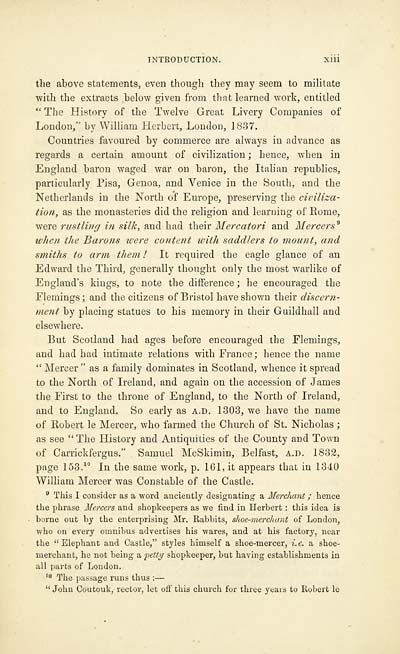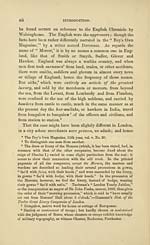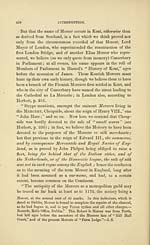Mercer Chronicle
(17) Page xiii
Download files
Complete book:
Individual page:
Thumbnail gallery: Grid view | List view

INTRODUCTION. Xlll
the above statements, even though they may seem to militate
with the extracts below given from that learned work, entitled
" The History of the Twelve Great Livery Companies of
London," by William Herbert, London, 1837.
Countries favoured by commerce are always in advance as
regards a certain amount of civilization ; hence, when in
England baron waged war on baron, the Italian republics,
particularly Pisa, Genoa, and Venice in the South, and the
Netherlands in the North of Europe, preserving the civiliza-
tion, as the monasteries did the religion and learning of Rome,
were rustling in silk, and had their Mercatori and Mercers 9
when, the Barons were content with saddlers to mount, and
smiths to arm them ! It required the eagle glance of an
Edward the Third, generally thought only the most warlike of
England's kings, to note the difference ; he encouraged the
Flemings; and the citizens of Bristol have shown their discem-
ment by placing statues to his memory in their Guildhall and
elsewhere.
But Scotland had ages before encouraged the Flemings,
and had had intimate relations with France; hence the name
"Mercer" as a family dominates in Scotland, whence it spread
to the North of Ireland, and again on the accession of James
the First to the throne of England, to the North of Ireland,
and to England. So early as a.d. 1303, we have the name
of Robert le Mercer, who farmed the Church of St. Nicholas ;
as see "The History and Antiquities of the County and Town
of Carrickfergus." Samuel McSkimin, Belfast, a.d. 1832,
page 153. 10 In the same work, p. 161, it appears that in 1340
William Mercer was Constable of the Castle.
9 This I consider as a word anciently designating a Merchant ; hence
the phrase Mercers and shopkeepers as we find in Herbert : this idea is
borne out by the enterprising Mr. Rabbits, shoe-merchant of London,
who on every omnibus advertises his wares, and at his factory, near
tbe "Elephant and Castle," styles himself a shoe-mercer, i.e. a shoe-
merchant, he not being a petty shopkeeper, but having establishments in
all parts of London.
10 The passage runs thus : —
"John Coutouk, rector, let off this church for three yeais to Robert le
the above statements, even though they may seem to militate
with the extracts below given from that learned work, entitled
" The History of the Twelve Great Livery Companies of
London," by William Herbert, London, 1837.
Countries favoured by commerce are always in advance as
regards a certain amount of civilization ; hence, when in
England baron waged war on baron, the Italian republics,
particularly Pisa, Genoa, and Venice in the South, and the
Netherlands in the North of Europe, preserving the civiliza-
tion, as the monasteries did the religion and learning of Rome,
were rustling in silk, and had their Mercatori and Mercers 9
when, the Barons were content with saddlers to mount, and
smiths to arm them ! It required the eagle glance of an
Edward the Third, generally thought only the most warlike of
England's kings, to note the difference ; he encouraged the
Flemings; and the citizens of Bristol have shown their discem-
ment by placing statues to his memory in their Guildhall and
elsewhere.
But Scotland had ages before encouraged the Flemings,
and had had intimate relations with France; hence the name
"Mercer" as a family dominates in Scotland, whence it spread
to the North of Ireland, and again on the accession of James
the First to the throne of England, to the North of Ireland,
and to England. So early as a.d. 1303, we have the name
of Robert le Mercer, who farmed the Church of St. Nicholas ;
as see "The History and Antiquities of the County and Town
of Carrickfergus." Samuel McSkimin, Belfast, a.d. 1832,
page 153. 10 In the same work, p. 161, it appears that in 1340
William Mercer was Constable of the Castle.
9 This I consider as a word anciently designating a Merchant ; hence
the phrase Mercers and shopkeepers as we find in Herbert : this idea is
borne out by the enterprising Mr. Rabbits, shoe-merchant of London,
who on every omnibus advertises his wares, and at his factory, near
tbe "Elephant and Castle," styles himself a shoe-mercer, i.e. a shoe-
merchant, he not being a petty shopkeeper, but having establishments in
all parts of London.
10 The passage runs thus : —
"John Coutouk, rector, let off this church for three yeais to Robert le
Set display mode to:
![]() Universal Viewer |
Universal Viewer | ![]() Mirador |
Large image | Transcription
Mirador |
Large image | Transcription
Images and transcriptions on this page, including medium image downloads, may be used under the Creative Commons Attribution 4.0 International Licence unless otherwise stated. ![]()
| Histories of Scottish families > Mercer Chronicle > (17) Page xiii |
|---|
| Permanent URL | https://digital.nls.uk/94860478 |
|---|
| Description | A selection of almost 400 printed items relating to the history of Scottish families, mostly dating from the 19th and early 20th centuries. Includes memoirs, genealogies and clan histories, with a few produced by emigrant families. The earliest family history goes back to AD 916. |
|---|

